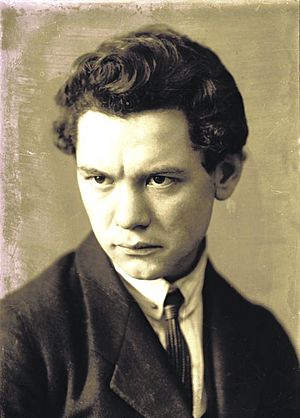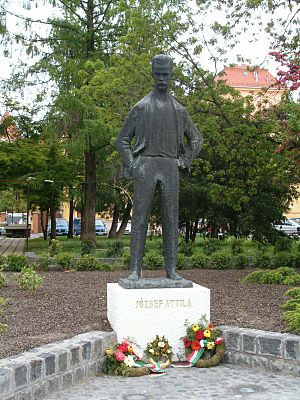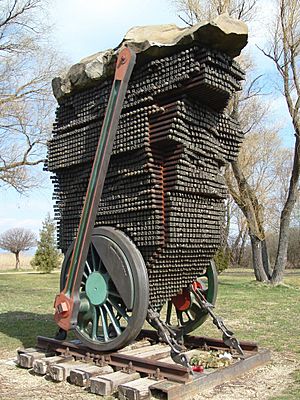Attila József facts for kids
Quick facts for kids
Attila József
|
|
|---|---|

József in 1924
|
|
| Native name |
József Attila
|
| Born | 11 April 1905 Budapest, Austria-Hungary |
| Died | 3 December 1937 (aged 32) Balatonszárszó, Kingdom of Hungary |
| Resting place | Kerepesi Cemetery, Budapest, Hungary |
| Language | Hungarian |
| Period | 1922–1937 |
| Genre | Poetry |
Attila József (Hungarian: [ˈɒtillɒ ˈjoːʒɛf]; 11 April 1905 – 3 December 1937) was a very famous Hungarian poet from the 20th century. Even though he wasn't well-known when he was alive, he later became one of Hungary's most famous poets around the world.
Contents
Biography of Attila József
Attila József was born in 1905 in Ferencváros, a poor area of Budapest. His father, Áron József, worked in a soap factory. His mother, Borbála Pőcze, was a Hungarian farmer. He had two older sisters, Eta and Jolán.
When Attila was three years old, his father left the family. His mother became ill, so Attila went to live with foster parents. At that time, "Attila" was not a common name. So, his foster parents called him Pista, which is a nickname for Stephen.
From age seven to fourteen, Attila lived with his mother again. She sadly died of cancer in 1919 when she was only 43. While he was still in school, Attila worked many different small jobs. He often described himself as a "street urchin."
After his mother passed away, Attila's brother-in-law, Ödön Makai, took care of him. Ödön was quite wealthy and helped pay for Attila's education. This allowed Attila to attend a good secondary school.
In 1924, Attila József started studying at Franz Joseph University. He wanted to learn Hungarian and French literature to become a high school teacher. However, he was asked to leave the university. This happened after he wrote a strong poem called Tiszta szívvel ("With clear heart"). The university thought he was not suitable to be a teacher.
With his poems, he traveled to Vienna in 1925. There, he earned money by selling newspapers and cleaning dorms. For the next two years, he lived in Paris and studied at the Sorbonne. During this time, he read works by important thinkers like Hegel and Karl Marx. He was also interested in the poet François Villon.
Attila József earned a little money from publishing his poems. He also received support from a kind helper named Lajos Hatvany. He later returned to Hungary and studied at Pest University for one year. After that, he worked as a French correspondent for the Foreign Trade Institute. He also became the editor of a literary magazine called Szép Szó (Beautiful Word).
Attila József supported the working class. In 1930, he joined the Hungarian Communist Party. His 1931 work Döntsd a tőkét (Blow down the block) was taken away by the government. His essay "Literature and Socialism" also led to legal trouble. In 1936, he left the Communist Party because he had his own independent ideas.
From childhood, Attila József faced health struggles. He received help from doctors for his well-being. He never married. He died on 3 December 1937, at the age of 32. He was staying with his sister and brother-in-law in Balatonszárszó. He died in a train accident. There is a memorial near where he passed away.
Attila József's Poetry
Attila József published his first book of poems, A szépség koldusa (Beauty's beggar), in 1922. He was only seventeen years old and still in school at the time.
In 1925, he published his second collection, Nem én kiáltok (It's not me who shouts). Famous Hungarian researchers and critics, like Béla Balázs and György Lukács, praised his work. In 1927, some French magazines also published his poems.
József's third collection, Nincsen apám se anyám (1929) (I have neither father nor mother), showed new influences. It was inspired by a style called surrealism from France. It also showed the influence of Hungarian poets like Endre Ady and Lajos Kassák.
In the 1930s, József started writing more about the challenges faced by working people. This showed his interest in Communism. In 1932, he published Külvárosi éj (Night in the outskirts), which was a very strong collection of poems. His most famous love poem, Óda ("Ode"), from 1933, explored the feelings for a loved one.
József's last two books were Medvetánc (Bear dance) and Nagyon fáj (It hurts very much). These were published in 1934 and 1936. These works brought him a lot of attention from critics. He began to support a kind and fair society, working with all groups who wanted democracy.
Attila József was the first to describe "transrealism" in his 1937 poem Welcome to Thomas Mann. His political writings were later put into Volume 3 of his Collected Works (1958).
Published Works
Original Books
- A szépség koldusa ("Beggar of Beauty"), 1922
- Nem én kiáltok ("That's Not Me Shouting"), 1925
- Nincsen apám se anyám ("Fatherless and Motherless"), 1929
- Döntsd a tőkét, ne siránkozz ("Chop at the Roots"), 1931
- Külvárosi éj ("Night in the outskirts"), 1932
- Medvetánc ("Bear Dance"), 1934
- Nagyon fáj ("It Hurts a Lot"), 1936
Books Published After His Death
- Collected verse and selected writings, 1938
- Collected verse and translations, 1940
- Collected works, 1958
- Collected works, 1967
- József Attila: Selected Poems and Texts, 1973
English Translations
- Perched on Nothing’s Branch, 1987 (translated by Peter Hargitai)
- Winter Night: selected poems of Attila József, 1997 (translated by John Batki)
- The Iron-Blue Vault: selected poems, translated by Zsuzsanna Ozsvath and Frederick Turner, Bloodaxe Books, 2000 ISBN: 1-85224-503-4
- Attila József: Sixty Poems, translated by Edwin Morgan, Edinburgh: Mariscat, 2001
- A Transparent Lion: selected poems of Attila József; translated by Michael Castro and Gabor G. Gyukics, Los Angeles, CA: Green Integer 149, 2006 ISBN: 1-933382-50-3
Poems in English-language anthologies:
- The Lost Rider. Dávidházi, P. et al. (Budapest: Corvina Books, 1997)
- The Colonnade of Teeth: Modern Hungarian Poetry. Gömöri, G. and Szirtes, G. (Newcastle-upon-Tyne: Bloodaxe Books, 1996)
- In Quest of the Miracle Stag: The Poetry of Hungary. Edited by Ádám Makkai (Budapest: Atlantis-Centaur, 1996 and 2000)
Tributes to Attila József
- An art exhibition called "Je ne crie pas"/"Nem kiáltok…!" ("I do not shriek") was held in 2007. It featured paintings by Thibault Boutherin. This exhibition was a tribute to József's poem "Nem én kiáltok" ("No Shriek of Mine").
- The American band The Party recorded a country-folk song in 2004. It was based on Peter Hargitai's English translation of József's poem "Tiszta szívvel" ("With All My Heart").
- Hungary has honored Attila József by issuing postage stamps. These stamps were released on 15 March 1947, 28 July 1955, 11 April 1980, and 11 April 2005.
See also
 In Spanish: Attila József para niños
In Spanish: Attila József para niños
 | Bessie Coleman |
 | Spann Watson |
 | Jill E. Brown |
 | Sherman W. White |



